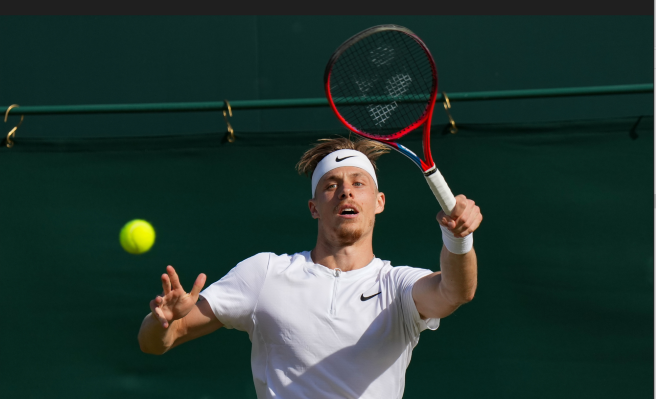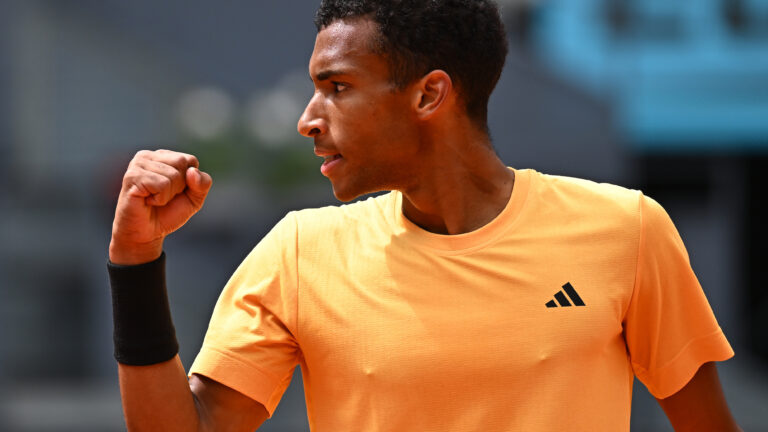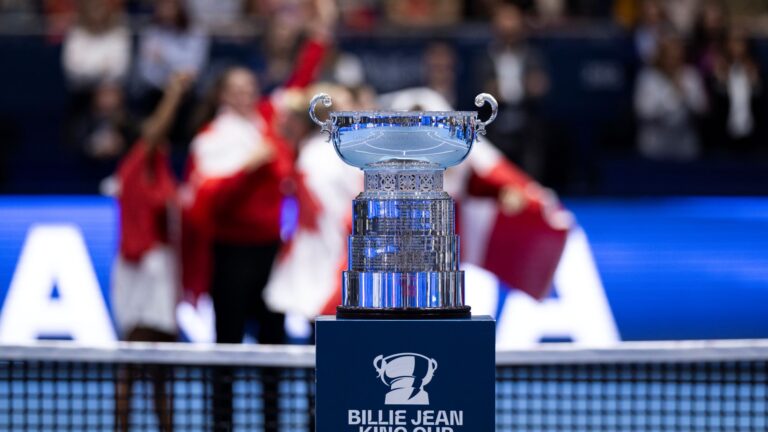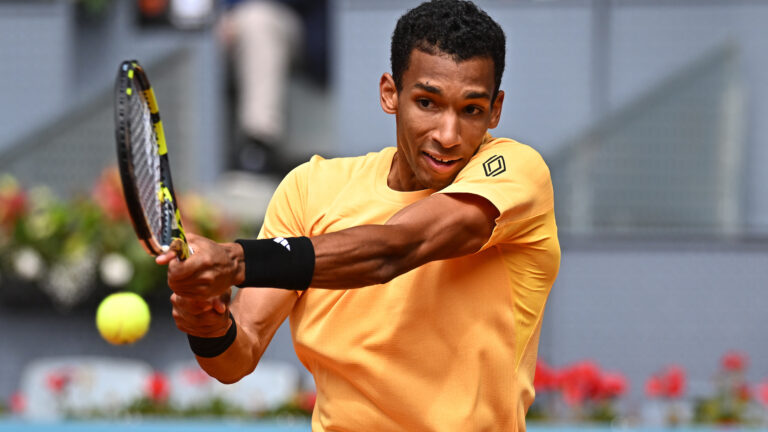
Photo: Martin Sidorjak
If there’s a mischievous double entendre to the headline here, it’s just because it seems like a gentler way to lessen the harsh reality of Bianca Andreescu and Denis Shapovalov both losing on Thursday – leaving no Canadians in the singles draws at Wimbledon 2022.
There had been hope the sixth-seeded Félix Auger-Aliassime, 13th seeded Shapovalov, Bianca Andreescu and Rebecca Marino, who had a first-round opponent she was capable of beating, would win multiple rounds and reach what the Brits like to call the “business end” of the tournament. But gods of lawn tennis did not smile on them this year.
None of the Canadians disgraced themselves with their efforts as was the case again on Thursday when Andreescu gave it her all in a 6-4, 7-6(5) loss to 17th-seeded Elena Rybakina of Kazakhstan, and Shapovalov was beaten 6-2, 4-6, 6-1, 7-6(5) by the solid play of American Brandon Nakashima. That result wound up coming with a caveat when Shapovalov later revealed he was dealing with a left adductor injury and was playing on painkillers.

The Andreescu – Rybakina match featured breathtaking hitting, with both players belting low, hard and frequently well-angled ground strokes off both wings.
There was nothing between them through the first nine games but Andreescu had a poor service game trailing 4-5, losing it to love on two winners by Rybakina and two of her own unforced errors.
In the second set, the players exchanged early service breaks and then did likewise late – Rybakina breaking to 5-3 and then Andreescu breaking back with a sensational forehand, angled service return winner to 4-5. She then held for 5-all.
In the deciding tiebreak, there had been mini-breaks each way when Andreescu served at 4-5. She appeared to have leveled at 5-all but Rybakina challenged a second serve and it was long – a double fault. That made it 6-4 – double match point – for the Kazakhstani. Two points later, when Andreescu misfired with a forehand into the net, the one hour and 37-minute match on Court 12 was over.
The numbers from the match don’t give away much about the players – Andreescu’s winners to unforced errors ratio was 21/18 while Rybakina was 23/21.
Probably Rybakina’s percentage of first-serve points won – 80 per cent – to Andreescu’s 65 per cent was key, as well as first-serve speeds of 118 and 119 mph.
“I didn’t expect for her serve to be that good,” Andreescu said about her 6-foot, 23-year-old opponent. “Well I don’t want to say that. I try not to have expectations, but when you watch people play on TV versus actually playing them, it can be different. On TV, it didn’t seem… She was pretty solid, both sides. She played a really great match.”

As close as the match was, the fast conditions on grass with Rybakina able to hit and serve through the low-bouncing court suggest Andreescu would be better served than the world No. 23 on a hard court with its higher, truer bounce.
Still, it was only Andreescu’s seventh tournament (four on clay and three on grass) since April after taking a sixth-month break since Indian Wells in early October, 2021. Her coach Sven Groeneveld didn’t want to comment about his player immediately after the match, just saying “it takes time.”
Putting things in perspective after those events in Stuttgart, Madrid, Rome, Paris, Berlin, Bad Homburg and now Wimbledon, Andreescu said, “I didn’t expect to be at this stage, actually, a couple months ago. So I’m super happy. Obviously it’s disappointing because you’re at a Grand Slam, you want to do really well.”
Adding in her media conference, “I have just got to keep working. I worked out for about an hour after my match, and no days off. Win or lose I was going to work out anyways. I think my fitness trainer pushed me just a little bit harder. I still feel it in my legs. I was like crying, too, while I was doing my squats. It wasn’t pretty (smiling).
“I know that two years ago I wouldn’t be able to work out after a match, for instance. I’d just be too tired. I’d push myself, but the strength and the flexibility and all of that is really, really showing, and for me – that’s so amazing. I go to bed every night, and I wake up every morning just being so thankful.
“I think we are good on that. Now it’s like ‘how do I start winning continuously again?’”

Andreescu plans for the summer include the WTA 250 in San Jose, Toronto (National Bank Open), Cincinnati and the US Open.
Getting back to the thought upper most in her mind, Thursday’s loss to Rybakina, Andreescu said, “I mean, I really wanted it. I really, really did. But today just wasn’t my day. I feel like the universe just keeps testing me – but I’m not going to let up.”

The Shapovalov – Nakashima match, also on Court 12, featured the extremes of tennis shot-making. The world No. 16 was dreadful in the first set with four winners and 14 unforced errors to three winners and zero unforced errors for Nakashima, but superb in the second with nine winners and only one unforced error to eight winners and eight unforced errors for the 20-year-old. Californian.
Shapovalov appeared to be in full-flight, just as he was in the final two sets of his five-set victory over Arthur Rinderknech in the first round. When he took a love-30 lead on the Nakashima serve in the opening game of the third set, it looked like déjà vu all over again. But Nakashima managed to hold serve and soon the match, unfortunately for Shapovalov, followed the pattern of his recent struggles.
“I was seeing a lot of second serves at that point,” he said about that potential turning point at the start of set three. “For sure was a couple of loose games for me in this match that definitely gave him more breathing room. Credits to him – he played some great tennis after that.”
The third set slipped away quickly but there were still chances in the fourth for Shapovalov as both players held serve until the tiebreak. In the tiebreak, the players traded mini-breaks to 2-all and then Nakashima had a match point at 6-5 that was nullified by a good Shapovalov serve. But two points later – a bad forehand miss long and a forehand into the net – and last year’s semi-finalist was out of the tournament.
“I was struggling physically today,” Shapovalov said. “The first match of course was a really long match (three hours and 23 minutes) – strained my adductor during that match. So it was a little bit of a struggle to kind of recover from that. So definitely not 100 per cent.”
From Nakashima’s side of the net, the view was, “he (Shapovalov) is definitely a very tough player – goes hot and cold. But I just tried to stay focused on myself one point at a time and know that he’s going to come up with some incredible shots and know that I’m going to have opportunities both on his serve and my serve. I just tried to stay calm and luckily I was able to close it out in the fourth.”
There was a familiar face in No. 56-ranked Nakashima’s courtside team that would be familiar to many Canadians, Duglas Cordero. He was the fitness trainer and No. 1 courtside cheerleader for Leylah Fernandez when she made her run to the US Open final last September, and as recently as March in Indian Wells. Nakashima said Cordero is no longer with Fernandez, adding about him, “he brings a lot of good energy to the team. Obviously he has a lot of experience with the fitness part of it. He’s such a funny guy to be around. I feel like we’ve been doing well together.”
Shapovalov, who said he had not previously had an adductor injury, was uncertain about his immediate future, but said he will definitely not be playing the grass-court tournament in Newport the week after Wimbledon.
He couldn’t defend the 720 rankings points he earned a year ago because the ATP is not awarding points this year at Wimbledon, so his No. 16 ranking will drop to No. 23 in the next rankings out on July 11th.
BIG W SIDEBAR
It’s the usual practice that professional tennis players try to isolate to concentrate right before matches – or maybe do some stretching with their physios.
On Wednesday at 4:30 p.m., a carefree Carlos Alcaraz was up at the Aorangi practice courts behind Court No. 1 signing autographs and taking selfies with the 40 or so excited fans located behind a barrier that gives them a view of players in that area. The 19-year-old Spaniard seemed to be enjoying himself and accommodating every request.
The thing was that the match on Court 2 featuring Angelique Kerber had already begun and he was next on against Tallon Griekspoor of the Netherlands.
That seemed of no concern to the happy-go-lucky Alcaraz. Ninety minutes later he was out on Court 3 on his way to a 6-4, 7-6(0), 6-3 second-round win over the No. 53-ranked, 25-year-old Dutchman.

Feature Photo: Martin Sidorjak


